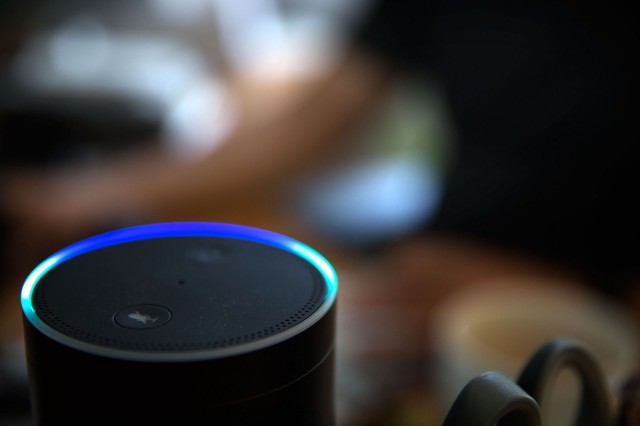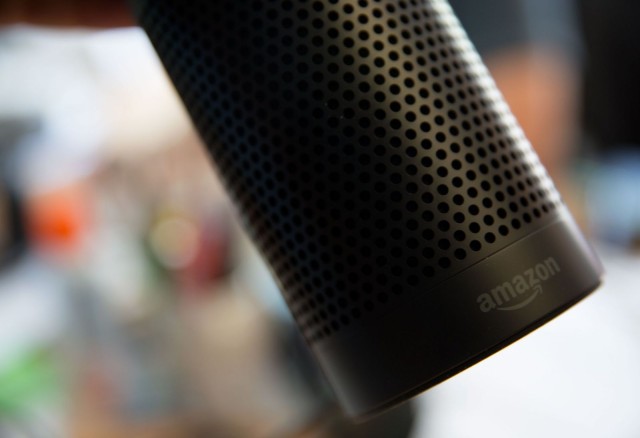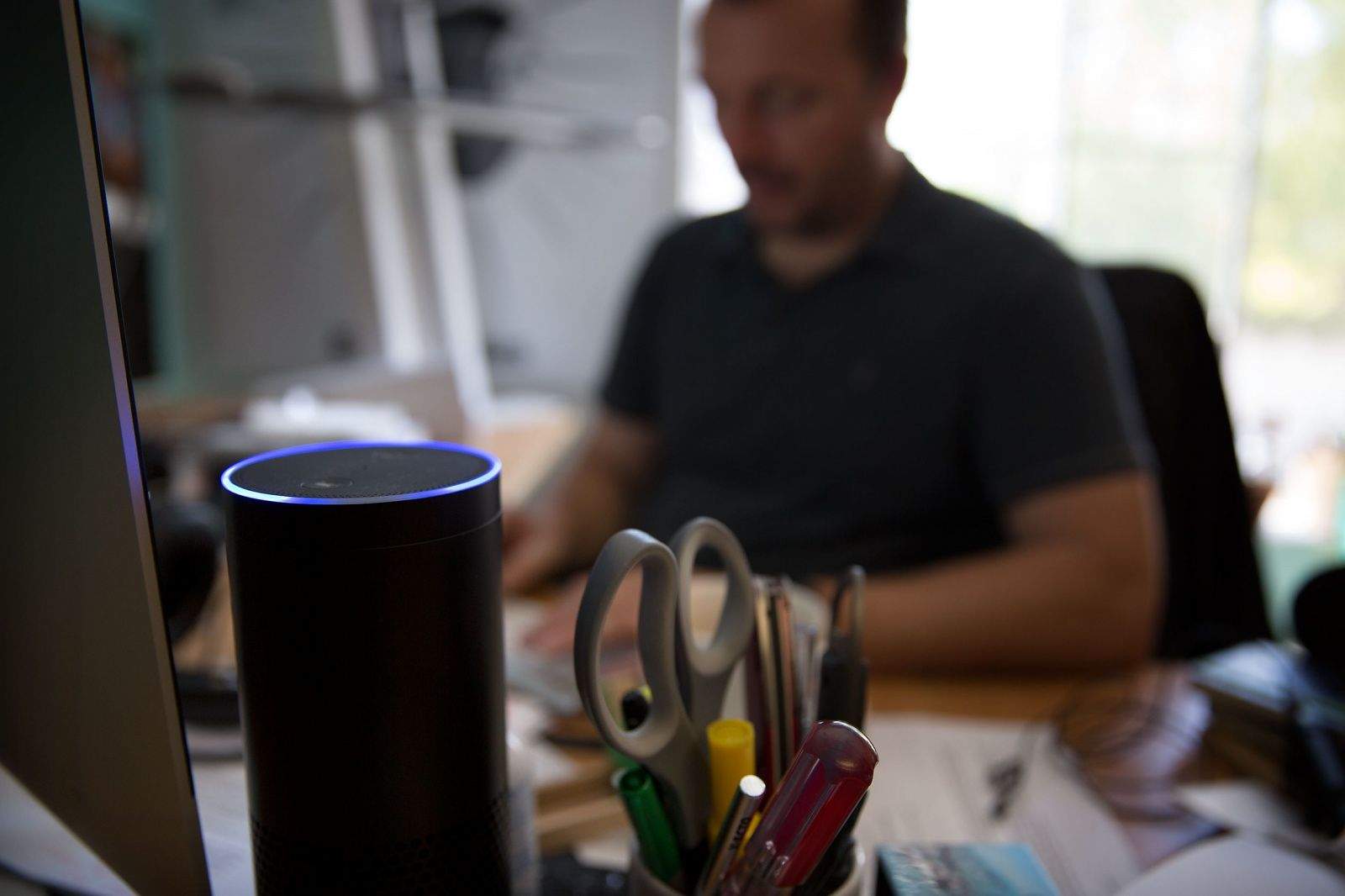Amazon’s Echo — an odd voice-activated domestic hub — just went on sale to the general public. If you’ve got $200 to burn, I recommend it. It’s oddly great — and it gives you a glimpse of the future.
If Apple’s Siri-controlled HomeKit comes close, controlling your home by voice is going to be a lot of fun.
This post contains affiliate links. Cult of Mac may earn a commission when you use our links to buy items.

Photo: Jim Merithew/Cult of Mac
We’ve all seen how great it is talking to the computer in Star Trek, or Orac in Blake’s Seven. The computer understands everything you say and never does anything dumb.
Then there’s Siri, which often works but when she doesn’t, she puts you in a murderous rage.
Now there’s Amazon Echo, a nine-inch black cylinder that you can command to do certain things, like play music, set alarms, and announce sports scores.
“What is the weather today?” you ask; or “Order more Nespresso coffee capsules.”
So far, it’s understood just about everything I’ve said, and acted accordingly. It’s a strange thing to tell a computer to do something, and it does it every time.
At the moment, Echo is an odd duck product. It doesn’t do much that’s terribly useful, but it’s a glimpse of the future voice-connected home, and it works a lot better than you’d expect.
What is Echo exactly?
Echo is a voice-activated Bluetooth speaker with built-in Web intelligence. It’s always on and understands voice commands. You just say “Hey Alexa,” and it lights up and listens. Setup is dead easy. You connect it to Wi-Fi via an iPhone app (Android and Fire too). There’s a remote with a mic (which is identical to the Amazon’s Fire TV’s) — but it doesn’t get much use.
Echo’s lower half is a decent 360-degree speaker. It has to be plugged in, so it can’t be taken out on the deck. It sits in one place, which presents a dilemma — living room or kitchen? Bedroom or den? Wherever it goes, it blends in. Finished in matt black, it looks fine on the kitchen counter or next to the telly.
Echo launched seven months ago to a select group of Prime members. It was initially greeted with raised eyebrows thanks to a risible launch video that showed it doing a bunch of silly things, like answering trivia questions (watch it below). This week it went on sale to the general public for $180. It’ll start shipping on July 14. It’s already got nearly 20,000 reviews (on Amazon, natch) and is highly-rated, with 4.5 out of 5 stars.
https://www.youtube.com/watch?v=KkOCeAtKHIc
What can it do?
Echo mainly does four things:
- Play music
- Answer simple Web queries
- Order things from Amazon
- Control a smart home (lightbulbs mostly)
Yeah, I know, it’s a weird mix. And at first glance, kinda useless given all our other devices. But if nothing else, it’s the smartest Bluetooth speaker I’ve ever used. It’s a lot easier to say, “Alexa, play The Clash” than pick up my iPhone.
I’ve also used it to order items on my Prime shopping list, tell me the traffic conditions before leaving work, do currency conversions, set timers and alarms, and add items to an ongoing shopping list.
It sits on my desk at work, and because it’s reliable and easy to interact with — no quirky commands or phrases — I tend to use it more than Siri on my iPhone or Apple Watch. I use it almost every day to listen to music on BBC Radio 1 (via TuneIn).
Echo also plays music from other sources, including Spotify, Pandora, iHeartRadio, and Amazon Prime. You can also play music from your iTunes library via Bluetooth.
So what else?

Photo: Jim Merithew/Cult of Mac
You can ask Echo a bunch of questions. It uses Microsoft’s Bing to answer simple things like:
- Who is the president of Iran?
- What’s the score of the Giants game?
- How many grams in a pound?
- Tell me a joke.
It’s surprisingly quick and accurate. The jokes are awful. Yeah, you’ve got speak clearly, and it has no sassy smarts like Siri. But for a quick question, it’s natural to shout it out, just as you would if there were another person in the room.
Shopping: Echo’s potential killer app
Shopping might be the killer app, but at the moment it’s pretty limited.
You say: “Order laundry detergent,” and after saying a secret code (which is preset in the app), your item is ordered using your default payment and shipping settings. It turns up two days later.
Trouble is, you can only order items previously purchased using Prime.
I can see it being useful for staples, but I don’t order that much toilet paper or teabags from Amazon. I have little desire to reorder the kind of stuff I normally buy: books, t-shirts, and socks.
Maybe one day it’ll be more useful, or I’ll learn good ways to use it. For example, Prime now includes Amazon Fresh, a grocery delivery service. I’m tempted to try it out for milk and eggs, but I feel like a lazy slob when there’s a grocery store a block away.
Grab bag of other features
Amazon recently added several other things to Echo, including:
- Reading aloud audiobooks from Audible
- Checking your Google calendar
- “Flash briefings” (Ask, “What’s going on?” and Echo plays hourly mini news broadcasts from NPR, BBC and others, inclding TMZ)
- IFTTT — Echo supports If This, Then That web scripts. Potentially another killer app, but so far it’s goofy stuff like assembling a spreadsheet of all the songs you’ve listened to.
- Home automation for select devices. Again, potentially killer but Echo currently supports just Belkin WeMo and Philips Hue. Which means you can turn the lights on and off, but not much else.
All well and good, but I don’t have Hue; I have no desire for any more spreadsheets; and most podcasts are better produced than audiobooks. But all this gives clues about the potential of Echo and hopefully HomeKit with Siri too.
Where it falls down
Echo works well because it’s got a limited feature set, but there’s a whole bunch of stuff it has no access to — my phone and texts; Twitter and Facebook: my to-do list and calendar (which is mostly on iCloud). It’d be great if it warned me to leave the house to make an appointment on time, or reminded me to pick up milk on the way to the office.
Why it’s a glimpse of the future
Amazon is joining Apple, Google, Samsung and dozens of others in the race to build the smart home.
Echo shows that it’s natural and easy to talk to a computer. Anyone can do it, there’s nothing to learn. You can bark orders while your standing at the sink or laying on the couch.
Apple’s HomeKit controlled by Siri just rolled out this week, but there’s several shortcomings. First, you have to speak into your phone. Siri is restricted to iOS devices, but what if Apple added it to the Mac or the AppleTV? It’d be much more natural to just shout out commands than speaking into your phone.
Second, early reviews say HomeKit is horrible. The Wall Street Journal’s Geoffrey Fowler tested some early Siri-controlled smart devices, and it’s so unreliable, he thinks the smart home is “still years away.”
Still, if Apple ever does get it together, it’s clear that an always-on device with voice is the most natural interface. If it controlled your home and was connected to the rest of your digital life, it could be revolutionary.
So should you get one?
If you’re already a Prime subscriber, I say go for it. Echo is $100, which is not bad for a Bluetooth speaker with a lot of smarts. The other stuff is gravy. Plus chances are Amazon will add more smarts to its servers and it’ll become even more useful.


